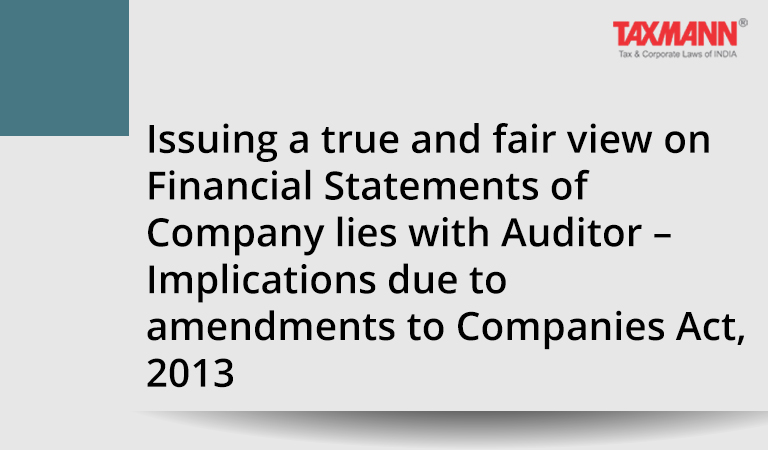Issuing a true and fair view on Financial Statements of Company lies with Auditor – Implications due to amendments to Companies Act, 2013
- Blog|News|Account & Audit|
- 2 Min Read
- By Taxmann
- |
- Last Updated on 1 November, 2021

[2021] 131 taxmann.com 300 (Article)
The Ministry of Corporate Affairs (MCA) has issued amendments to the Companies Act, 2013 including an amendment to Schedule III of the Companies Act, 2013 to increase transparency and to provide additional disclosures in the financial statements. Further, CARO 2020 enhances the reporting requirements for auditors.
In this connection, there was a further amendment to the provisions of Rule 11 of the Companies (Audit and Auditors) Rules, 2014 to include additional matters in the Auditor’s Report w.e.f. 1st April 2021. But the requirement related to the audit trail would be applicable from 1st April 2022. This article highlights the implications of the amendments to the Companies Act 2013 with reference to the Auditor’s responsibilities and issuing a true and fair view on the financial statements of the Company and the enhanced role of Auditors.
Impact of amendment to the definition of a listed company
It is to be noted that Section 2(52) of the Companies Act 2013 has been amended to include a definition of a listed company under the MCA notification dated 19th February 2021 on the Companies (Specification of Definitions, Details) Second Amendment Rules, 2021 where a certain class of companies was excluded from the definition of a listed company. This will impact the provisions relating to the appointment of auditors, the appointment of an internal auditor, and compliance with auditor’s rotation norms. Certain stringent conditions are prescribed under the Companies Act 2013 for listed companies to comply with at least one-third of the total number of directors to be independent directors, the appointment of an internal auditor, and compliance with auditor’s rotation norms, etc. Companies that no longer qualify as listed companies pursuant to the aforesaid amendment need not be required to comply with such stringent requirements.
Thus, as per amendment to the definition of listed company, (a) Private companies which have listed their non-convertible debt securities on private placement basis on a recognized stock exchange in terms of SEBI (Issue and Listing of Debt Securities) Regulations 2008; (b) Public companies which have not listed their equity shares on a recognized stock exchange but have listed Non-convertible debt securities or non-convertible redeemable preference shares or both the above categories issued on private placement basis in terms of the SEBI (Issue and Listing of Debt Securities) Regulations, 2008/ SEBI (Issue and Listing of Non-Convertible Redeemable Preferable Shares) Regulations, 2013 respectively; and (c) Public companies which have not listed their equity shares on a recognized stock exchange but whose equity shares are listed on a stock exchange in a permissible foreign jurisdiction as specified in the sub-section of Section 23(3) of the Companies Act, 2013, will no longer come under the definition of a listed company and thus the stringent conditions applicable to auditors are no longer applicable to the aforesaid categories of companies.
Click Here To Read The Full Article
Disclaimer: The content/information published on the website is only for general information of the user and shall not be construed as legal advice. While the Taxmann has exercised reasonable efforts to ensure the veracity of information/content published, Taxmann shall be under no liability in any manner whatsoever for incorrect information, if any.

Taxmann Publications has a dedicated in-house Research & Editorial Team. This team consists of a team of Chartered Accountants, Company Secretaries, and Lawyers. This team works under the guidance and supervision of editor-in-chief Mr Rakesh Bhargava.
The Research and Editorial Team is responsible for developing reliable and accurate content for the readers. The team follows the six-sigma approach to achieve the benchmark of zero error in its publications and research platforms. The team ensures that the following publication guidelines are thoroughly followed while developing the content:
- The statutory material is obtained only from the authorized and reliable sources
- All the latest developments in the judicial and legislative fields are covered
- Prepare the analytical write-ups on current, controversial, and important issues to help the readers to understand the concept and its implications
- Every content published by Taxmann is complete, accurate and lucid
- All evidence-based statements are supported with proper reference to Section, Circular No., Notification No. or citations
- The golden rules of grammar, style and consistency are thoroughly followed
- Font and size that’s easy to read and remain consistent across all imprint and digital publications are applied



 CA | CS | CMA
CA | CS | CMA
